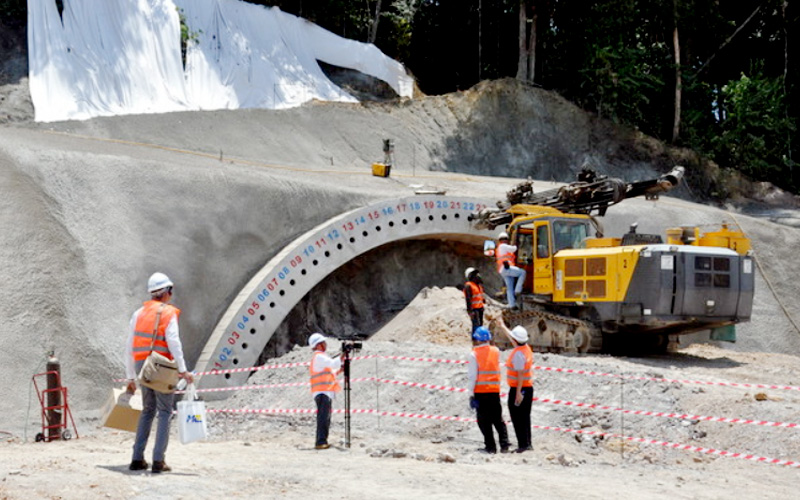
The last time a Pakatan Harapan-led (PH) government was in power, it quickly put a stop to three mega infrastructure projects initiated under China’s Belt and Road Initiative (BRI).
The biggest of the three projects was the East Coast Rail Link (ECRL) while the other two were pipeline projects – the Trans-Sabah Gas Pipeline and a multi-product pipeline in Melaka. All the projects were undertaken by the Barisan Nasional (BN) government led by then prime minister Najib Razak.
After toppling the BN coalition in the May 2018 general election, the PH government under prime minister Dr Mahathir Mohamad vowed to renegotiate or cancel “unfair” Chinese infrastructure deals authorised by Najib. The suspension order was placed on the projects in July 2018.
The projects’ suspension threatened to throw a spanner into Malaysia-China ties, with some of the government’s critics claiming it could deal a devastating blow to the economy if China decided to retaliate economically.
It was only after months of negotiations that Malaysia and China agreed to resume construction of the ECRL in April 2019. The two sides agreed to cut the cost of the 688km rail line connecting Port Klang in Selangor to Kota Bharu in Kelantan to RM44 billion from the original RM65.5 billion. The other two pipeline projects were discontinued.
The ECRL is seen as one of the most high-profile projects connected to the BRI, Chinese president Xi Jinping’s grand plan to deepen trade links with Asia and Europe through massive infrastructure investments.
Now that PH is once again back in power with Anwar Ibrahim as the prime minister, he faces similar geopolitical pressures as Mahathir did in 2018.
It is reassuring that Anwar, at his maiden press conference after becoming prime minister, highlighted the importance of China as an “important neighbour” with whom Malaysia had to strengthen relations.
Its importance is reflected in the Malaysia-China trade figures. During the last 25 years, Malaysia’s exports to China increased from US$2.4 billion (RM10.8 billion) in 1995 to US$38.7 billion (RM173.4 billion) in 2020. During the same period, China’s exports to Malaysia increased from US$1.62 billion (RM7.3 billion) in 1995 to US$51.5 billion (RM230.7 billion) in 2020.
Anwar also said it was equally important to enhance ties with other key partners including the US, Europe, India and Asean.
He recognises the geopolitical realities in Asia, acknowledging China’s strategic importance while also stressing the need to enhance ties with the global superpower US.
Nevertheless, the worst thing Anwar could do is to get entangled in the great power competition playing out in the Indo-Pacific region between the US and China.
Anwar has been perceived, rightly or wrongly, by some as the poster boy for Malaysian democracy and the western powers’ preferred leader to helm the government.
So, any potential move by his government against China’s interests, be it political or economic, could be interpreted as taking sides against it in the intensifying geopolitical battle between the two great powers.
Such a scenario would be an economic disaster, given that China is Malaysia’s No 1 trading partner, as it is with most other countries in the region.
For a recent example of such a scenario, we only have to look at how Australia-China ties ruptured under Scott Morrison, who was booted out of the prime minister’s office after his Liberal National coalition lost Australia’s election last May.
Australia’s prosperity in recent decades has arguably been supercharged by a rising China, its No 1 trading partner, hungry for its resources. Bilateral ties between the two nations had been relatively good until Morrison came to power in 2018.
He quickly became the spear for US interests in the Asia-Pacific region, which seeks containment of China to prevent it overtaking America as the world’s pre-eminent economic and military superpower.
Morrison’s hawkish anti-China agenda greatly antagonised China, which responded with retaliatory economic measures that devastated key industries in Australia, resulting in billions of US dollars in lost trade annually.
Recent reports that the US plans to station nuclear-capable B-52 bombers in Northern Australia by 2027 are expected to further rile up China.
The Australian case study in how not to antagonise your biggest trading partner should be instructive for the new administration here.
Malaysia would do well to stick to Asean’s guiding principle for the past five decades – to remain neutral in relation to the superpowers.
In fact, it was in 1971 or 51 years ago in Kuala Lumpur that the then five Asean members – Indonesia, Malaysia, the Philippines, Singapore and Thailand – signed the Zone of Peace, Freedom and Neutrality (Zopfan) declaration.
Zopfan is to keep Southeast Asia “free from any form or manner of interference by outside powers and broaden the areas of cooperation”. Neutrality has served the region well over the decades.
Let’s not be naïve. There will inevitably be pressure exerted by the superpowers – the US on the one side, and China-Russia on the other – on Anwar’s government.
However, adhering to Asean’s principle of neutrality while maintaining our national sovereignty will be in the best interest of the Malaysian people.
This essentially means not siding with any bloc but to be friends with all. Do business with China, do business with the US and Europe. Issues like territorial disputes in the South China Sea should be resolved through negotiations.
Ultimately, it should be a “win-win”, and not an “I win, you lose” scenario.
It is undoubtedly a delicate balancing act for Anwar. But if he can successfully navigate the minefields of great power competition in our neighbourhood, Malaysians will be the winners. - FMT
The views expressed are those of the writer and do not necessarily reflect those of MMKtT.



No comments:
Post a Comment
Note: Only a member of this blog may post a comment.